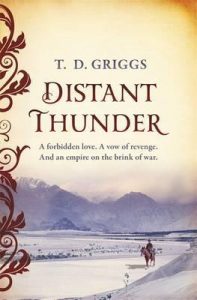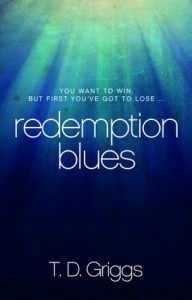My guest today is T.D.Griggs who has been kind enough to provide a fascinating post about how our links to historical events are closer than we think….
I have a great mate whose grandfather, as a child, knew a man who had been a powder monkey at the Battle of Trafalgar.
Yes, I did a double-take, too. But it stacks up. My friend, like me, is in his early sixties. His dad was born around 1920, the son of a 45-year-old father. So my mate’s granddad entered the world in 1875. Now, a lad who was fifteen years old at Trafalgar in 1805 would have been 90 in 1880. Not too fantastic, then, for my friend’s grandad, at seven or eight, to have sat open-mouthed at the old boy’s knee in 1883, listening to his incomprehensible tales of crashing broadsides and decks slippery with blood.
We empathise immediately when a personal link is made, or at least when we see that one is possible. It profoundly changes our reaction to history. We laugh about medieval murder (Horrible Histories) but you’d need a strong stomach to make a joke about Auschwitz, or even about the Somme. Even Blackadder treated that slaughter with reverence – remember the famous dissolve to a field of poppies? Both of these events are close enough for us to have known someone involved, or to know someone who knew someone.
Still, it always comes as a shock when we are forced to confront the truth – that people in history had loves and hates and fears precisely like our own.
What I find surprising about this is that it is…well, surprising. But the fact is that when we’re young we believe the world started when we did. To take my own case, I was twelve in 1960. At that time men who had fought in the Battle of Britain were under 40, and those who had landed on the Normandy Beaches were in their mid thirties. Like most bloodthirtsy kids I was excited by battles and slaughter and general mayhem – but I have no recollection of the slightest curiosity about the experiences of any of these young veterans, several of whom I must have met. To me their personal histories ranked with Agincourt, impossibly distant and irrelevant to the point of invisibility. Yet it had all really happened less than 20 years earlier. World War Two was as recent then as the first Iraq War is now.
The sense that we are part of a continuum only grows as we grow. So when I now look into that distorting mirror we call the past, the Second World War seems far more immediate to me than ever it did when it was almost close enough to touch.
These days I feel a bit guilty about all that. Maybe it was this which led me to feature some of my long-dead father’s wartime experiences in my recent novel THE WARNING BELL (under pen-name Tom Macaulay, Orion 2010). It’s a father-son mystery with links back to WW2, and my research led me to the astounding discovery that my father’s 1942 launch still existed, rotting in a junkyard in Catalonia. My brother and I tracked it down there and even climbed aboard it for the first – and last – time as a tribute to our father.
My latest book, DISTANT THUNDER (by T.D.Griggs, Orion 2013) will appear in Australian shops in March as a paperback. It’s a Victorian epic, the story of two people whose relationship is caught up in the crushing machinery of empire. I don’t have any direct personal link with the Victorian era, but nevertheless the story was triggered by a connection with my own life, though at one remove. I’m old enough to remember Churchill’s funeral: indeed, this man lived so far into my own era that he could have bought the first Beatles LP (though I doubt he did). And yet he had been born early enough to take part in the last regimental cavalry charge of the British army. That was against the Mahdists at the Battle of Omdurman. This intrigued me. After all, the Battle of Omdurman in 1898 is the stuff of ripping yarns and picture books. A bit like Agincourt, really.
Yet when I discussed the idea with my editor, he told me an extraordinary story.
‘Funny thing,’ he said, ‘I know an English girl who’s just opened a Sudanese restaurant in London with her new husband.’
‘What’s funny about that?’
‘Just that her great-grandfather was at the Battle of Omdurman, in Kitchener’s Army. But her husband is Sudanese. His great-grandfather was at the same battle – on the other side.’
T.D.GRIGGS was born in London and has lived and worked on four continents. He holds British and Australian nationality, and has worked variously as a truck driver, journalist, film extra, founder and MD of a successful communications consultancy in Sydney, and – for about seven sweaty hours – as a volunteer fire fighter. Despite that, much of the Australian bush survives. He has written many short stories, and four novels: the Victorian epic DISTANT THUNDER and modern day psychological drama REDEMPTION BLUES under his own name; and father-son WW2-linked drama THE WARNING BELL, written as Tom Macaulay. T.D.Griggs is also a professional business writer with an international client base. He lives with his wife Jenny in Oxford, UK. To find out more visit his Website or follow him on Twitter or Facebook
Bangalore, 1893. Frank Gray’s enchanted Indian boyhood comes to a brutal end the night his mother is savagely assaulted by a British cavalry officer. As the scandal destroys his family, Frank has only revenge left to live for.
Grace Dearborn grows up in England, wealthy and privileged. But once she learns the human cost of her family’s fortune, she is on a collision course with the father she adores.
Frank and Grace share more than a hatred of injustice. Their personal demons drive them from bohemian Vienna to the savagery of the North-west Frontier, from the slums of London to the deserts of the Sudan. But escaping the past is the hardest battle of all.
Tim, thanks for this wonderful post. All the best with Distant Thunder!








Leave a Reply